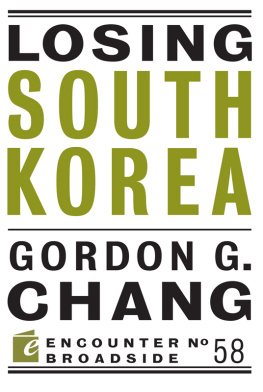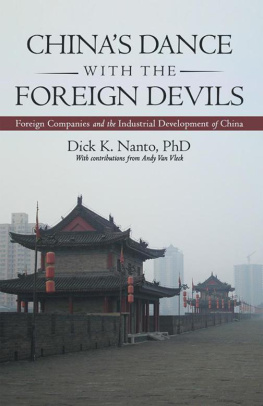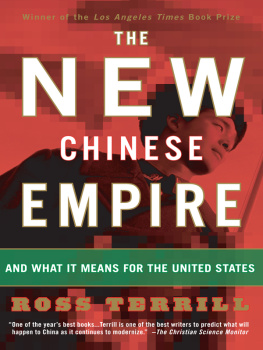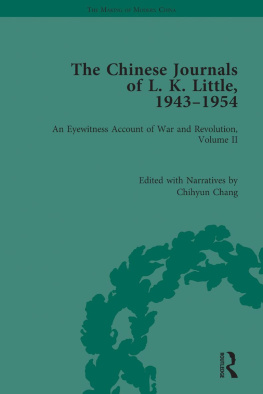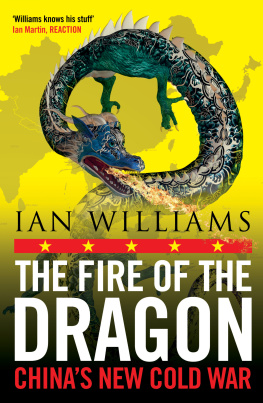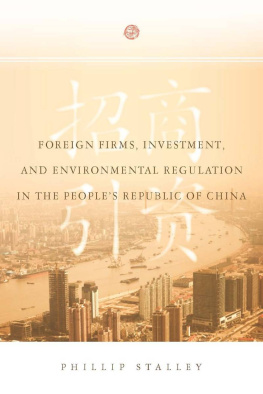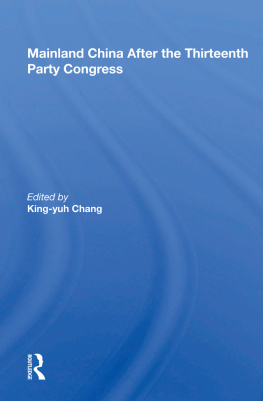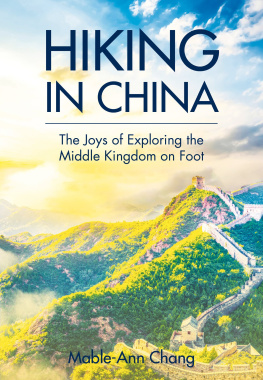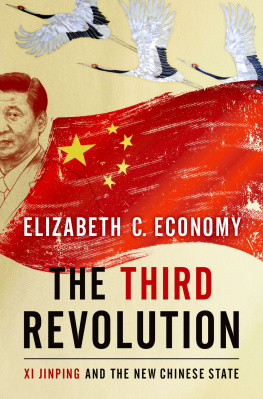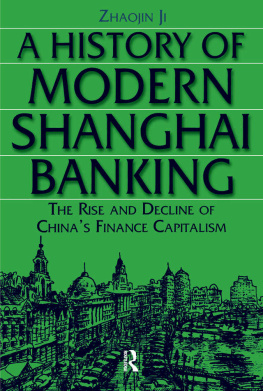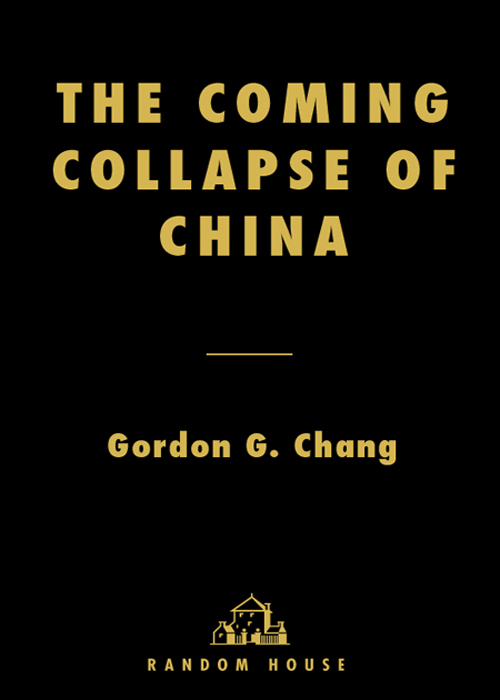
THE
COMING COLLAPSE
OF CHINA
THE
COMING COLLAPSE
OF CHINA
Gordon G. Chang
CONTENTS
FOREWORD
The Final Chapter
A single spark can start a prairie fire.
MAO ZEDONG
S EEK TRUTH FROM FACTS , said former Chinese leader Deng Xiaoping, who used that Maoist slogan to attack the foundations of Mao Zedongs China. Today some see the facts as pointing to a glorious future for the worlds most populous country. Extrapolate current trends, we are told, and in 2010 China will have the
It is easy to make the case, based on the facts, that China will dominate first Asia and then the rest of the world in some not-too-distant future. Multiply the worlds largest population by extraordinarily high rates of economic growth and you get a giant of awesome proportions. Think of the United States, only three times larger and more powerful. To get a glimpse of what is possible in the future, just look at how far China has come since 1978, when Deng Xiaoping began to junk Maos legacy.
The fear, sometimes overtly stated but under the surface if not, is that China will one day push its neighbors out of the areas it claims and America back across the Pacific. The outrage over the supposed Chinese theft of nuclear secrets from Los Alamos is as much a reflection of Americas apprehension as of its indignation. Today China is that is targeting the United States with nuclear weapons.
Historical inevitability seems to be on the side of Beijing. China was the for fifteen hundred years after the Roman Empire fell. Chinese art, culture, science, trade, and exploration flourished. Next, European society triumphed and then the United States. What could be more appropriate than China starting the new millennium as the worlds leading nation as the torch is returned to its rightful owner?
Foreigners, for various reasons and in many ways, have been fascinated, even blinded, by China, so it has been difficult for them to see the facts. Many have been dazzled by its potential, a theme that binds together most perceptions of China. Others see in China only danger, a threat magnified by the breath of its geography and the mass of its people.
The truth is that China has all the makings of a great nation, one that can fulfill the destiny it sees for itself. And China does not suffer from small vision: President Jiang Zemin is pursuing Big Country diplomacy, which seeks recognition of China as an equal to the United States and the European Union on the world stage. It should come as no surprise that Jiang, as a part of these efforts, is pushing China into the World Trade Organization.
On paper, China looks powerful and dynamic even today, less than twenty-five years after Deng Xiaoping began to open his country to the outside world. In reality, however, the Middle Kingdom, as it once called itself, is a paper dragon. Peer beneath the surface, and there is a weak China, one that is in long-term decline and even on the verge of collapse. The symptoms of decay are to be seen everywhere.
The fanaticism that carried Mao from one campaign to another, from the Great Leap Forward to the Cultural Revolution, burned out and left the Chinese empty. Today that spirit has been rekindled as millions follow the teachings of an exile who promises hope. The Communist Party looks at Li Hongzhi and his spiritual movement and sees the images of Maos peasant army of the late 1940s sweeping across the plains. No wonder Chinas leading political organization acts as if it were fighting for its survival.
The Communist Party has a destiny, and that is to lead the Chinese people for all time. There has never been any tolerance for other voices, and there is none today. Thus Chinas leaders could do only one thing when the Falun Gong, without warning, surrounded the Partys leadership compound in Beijing in April 1999. The Party banned that group and drove it underground. But the Falun Gong is fighting back; its members have lost their fear.
Cultists, activists, splittists, and others: China is fighting them all. Beijing strikes hard against these elements but so far has been able only to muzzle sentiment, not extinguish it. Dissidents may retreat. Their ideas, however, do not.
There are other threats. Resentment against the corruption of Party officials and lawless government smolders and is infinitely harder to handle than protesters. The price the Party has paid for its monopoly on power is the loss of community with the people of the Peoples Republic. The Party, as a result, is fundamentally unpopular, surviving only by withdrawing from the lives of the masses.
Then there are the armies of the unemployed roaming China, the single most immediate threat to the continued existence of the Party and the government it dominates. At any one time, the unemployed and underemployed exceed the combined populations of France, Germany, and the United Kingdom. When will they speak?
True, the Communist Party thinks about corruption and resentment and unemployment, but it is unwilling to undertake structural reform. The Party rejects most change of consequence and so does not deal with the fundamental sources of instability. In its fight against its enemies, from the Tibetans to the Taiwanese, the political leadership seeks stability above all else. In seeking stability, the Party is preventing the change that could save the Peoples Republic.
And change is needed because the symptoms of economic decline are all too evident. State-owned enterprises, or SOEs, the product of Stalinist notions of economic development and Maoist ideas on social planning, are uneconomic. The state-owned banks are hopelessly insolvent, as a group the weakest in the world. Deflation has gripped China for more than three years. Mountains of obsolete inventory scar balance sheets. Foreign investment stagnates. Corruption eats away at the fabric of the economy, and foreign currency flees the country.
If these were simply economic issues, Beijings technocrats could find answers. Unfortunately, any solutions must first meet the test of ideological correctness. Communist Party theologians have argued, seemingly endlessly, about correct socialist remedies. Dengs contribution to the development of socialist theory was not to let theory get in the way of development. Do not debate! is one of my inventions, said the late Chinese leader. His heirs take a different approach.
As time passes, the underlying problems fester. Economic dislocations become social ones, with dark political overtones. At some point there will be no solution. Then the economy, and the government, will collapse. We are not far from that time.
Can Chinas leaders prevent the economic tragedy that is unfolding? The central government is now doing the only thing it can: keeping the economy going through fiscal stimulus on a massive scale. How to pay for all of this? Chinas budget deficit has mushroomed in the last few years. Add the bad and nonperforming loans of the state-owned banks to the official national debt, and Chinas financial status looks precarious.
How much time does China have? No one knows for sure, but China cannot continue to spend at the current pace for much longer. Beijing has about five years to put things right. No government, not even Chinas, can defy the laws of gravity forever.
Time is in extremely limited supply now that China is on the verge of joining the World Trade Organization. In order to become a member, China has agreed to open its markets. U.S. Trade Representative Charlene Barshefsky says that the changes to be unleashed by WTO accession will be That is understating the case: accession will shake China to its foundations.
Next page


